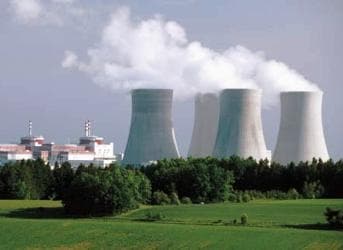As Japan and France move away from nuclear energy, is it the endgame for nuclear proponents?
As the world slouches into the 21st century, one of the global economic realities is that more and more developing nations, much less the “First World,” are competing for fossil fuel resources whose production is rising more slowly than demand.
Complicating the picture are the booming economies of two BRIC nations, India and China, a development that ensures that developed nations will be in increasing competition for global supplies of oil, natural gas and coal, whose production is struggling to keep with increasing demand.
An alternative relentlessly pushed by Western corporate interests is nuclear power, whose proponents never cease to remind their potential audience that nuclear power plants (NPPs), unlike those fired by coal or oil, emit no greenhouse gases, no small consideration in the world community worried about global warming.
But the global nuclear power industry has three strikes against it – cost, catastrophes, whether man-made (Three Mile Island, Chernobyl) or natural (Fukushima Daiichi) and the not inconsiderable problem of disposing of nuclear waste generated by NPPs. Despite civilian nuclear programs dating back to the early 1960s, no country has yet developed an environmentally safe means of disposing of NPP’s nuclear by products, and these three issues are forcing a slow but significant worldwide rethink on the viability of nuclear electrical production.
Needless to say, the well-entrenched world nuclear power generation, with trillions of dollars invested and potentially billions more in the form of new NPP contracts, is fighting a furious rear-guard action, but the ultimate outcome of the titanic struggle is anything but clear, given a number of recent events.
RELATED: Shell to Build the World's First Ever Floating LNG Plant
The United States has 104 NPPs in operation, France - 58, Japan’s (currently offline) 54, Russia 32, South Korea 20, India 19, Canada 18, Germany 17, China 11, Taiwan six and Pakistan two, while nations with nuclear power reactors under construction include China with 23, Russia - nine, South Korea – six, India four and Taiwan two.
On 14 September, bowing to public opposition, Japan's government joined Germany and Switzerland in turning away from nuclear power after the March 2011 earthquake unleashed a tsunami that destroyed Tokyo Electric Power Co.’s six-reactor Fukushima Daiichi NPP complex. The decision represents a major about-face by the Japanese government of Prime Minister Yoshihiko Noda, which before Fukushima stated that the nation’s energy policy would increase the country’s share of atomic energy to more than half of the country’s electricity generation. Noda’s government intended to ramp up by 300 percent the country’s share of renewable power to 30 percent of its energy mix. Noda's decision earlier this year to restart two NPPs to avoid potential summer power outages, flying in the face of public opinion, energized anti-nuclear protests.
Noda’s government’s decision to phase out the country’s NPPs by both refusing to extend nuclear plant operating licenses beyond 40 years and committing to building no new ones provoked an immediate and predictable backlash from Japan's powerful nuclear energy lobby, which argued that the short sighted decision would boost electricity prices, making industry uncompetitive and complicating efforts to reduce greenhouse gas emissions.
Nearly fifty years ago, when the U.S. led the way in deploying civilian nuclear electricity NPPS, proponents excitedly maintained that soon electricity would be “too cheap to measure.”
But, while this advertising slogan never panned out, a second nuclear power reality overlooked by proponents of its centrality to a nation’s power generation base is the uncomfortable fact that it was in fact born from the stupendously expensive U.S. “Manhattan Project,” which produced the nuclear weapons dropped on Japan in august 1945, which both ended World War Two and inaugurated the Cold War. The nexus between civilian electrical power generation and weaponry have existed uneasily since then, as evidenced by the recent international campaign against Iran.
RELATED: Oil Companies Race Back to the Gulf of Mexico
So, what to make of Japan’s tepid decision to downsize its nuclear energy commitment? Thoughtful analysts might note that Europe’s leading technological powerhouses, Germany and Japan, have apparently decided to pursue energy alternatives to nuclear while France, Europe’s leading user of nuclear energy, is also rethinking its position.
ADVERTISEMENT
Do Berlin and Tokyo know something that other nations do not? Whatever occurs, expect a vigorous rear-guard action by the global nuclear power industry, as it attempts to preserve its multi-billion dollar industry, starting with them suddenly joining the climate change bandwagon by emphasizing that NPPs generate zero greenhouse gases.
Which, of course, is why former Fukushima residents outside the NPP’s 12 mile exclusion zone breathe so much more easily.
By. John C.K. Daly of Oilprice.com



















Many months after fission stops, only a tiny fraction of this radioactivity still exists; and of this, only a tiny fraction ever escaped from the wrecked Japanese reactors. Thus, in the very same researchers Juble alludes to -- but does not, of course, reference -- natural potassium-40 radioactivity is reported, in the subject fish, to greatly exceed the similar man-made cesium radioactivity. I seem to recall one of the researchers trying to make himself heard saying he would have no hesitation in eating it.
Japan is unlikely, in the end, to join Germany in its foolish game of energy chicken.
France is likely to get rid of its socialist government in time to step away from the anti-nuclear abyss.
Liquid Fluoride Thorium Reactors (LFTRs, pronounced "lifters") appear to resolve all three of those "strikes".
1: LFTRs should provide electricity cheaper than from coal.
http://www.amazon.com/s/ref=nb_sb_ss_i_1_7?url=search-alias=stripbooks&field-keywords=thorium+energy+cheaper+than+coal&sprefix=thorium,stripbooks,269 . . . Unstrike one.
2: LFTRs are inherently safe, walk away safe in some designs. . . . Unstrike two.
3: LFTRs can burn up the TRUs in Spent Nuclear Fuel, the only part of the NPP "by product" that results in a significant storage issue. . . . Unstrike THREE!